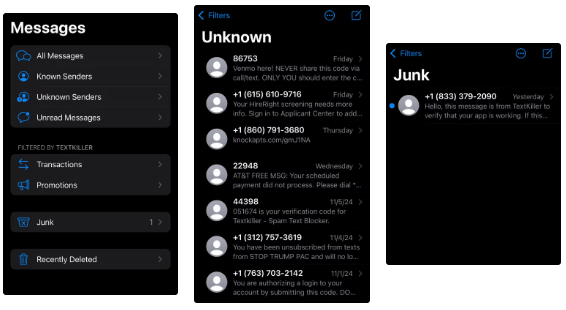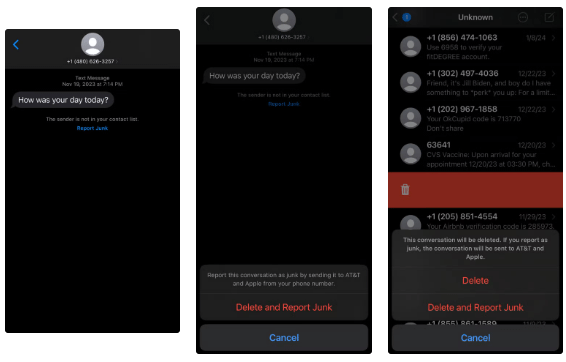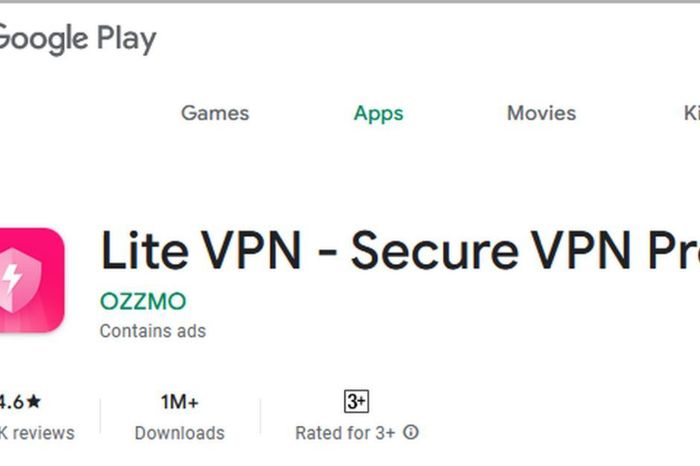Prevent text message scams with these features and tricks!
With SMS phishing attacks (aka smishing) on the rise, it's time to harness the power of some useful tools to prevent yourself from becoming a victim.
TextKiller

Instead of trying to figure out whether a text message is real or fake yourself, why not let an app like TextKiller do it for you? TextKiller (available only on iOS) claims to block up to 99% of spam text messages. To do so, it compares the messages you receive against its ever-growing database of smishing messages. If the message you receive matches one in its database, it's automatically blocked. If you have TextKiller enabled, you can also filter out transactional, promotional, and spam messages.
Setting up TextKiller is simple. Once you download TextKiller, open your iMessages settings , scroll to Unknown & Spam , and tap the Enable TextKiller button.
The app offers a 7-day free trial, after which you'll have to pay $69.99/year or $4.99/week. That may seem steep, but it's nothing compared to the billions of dollars lost to phishing attacks.
Permission Slip

In 2006, British mathematician Clive Humby declared that data was the new 'oil.' The comment proved to be prophetic, as every company today is collecting user data and using it for whatever purpose they see fit. The more personal data they collect, the greater the chance that it will fall into the wrong hands.
To prevent this from happening, you can use Permission Slip (available on Android and iOS) to easily ask companies to delete or not sell your personal information. You can request that your data be deleted or not sold from any company you've ever interacted with.
If you pay the annual fee of $59.99, Permission Slip will fill out the deletion request form on your behalf. If you opt for the free version, the app will redirect you to the correct page where you can fill out the necessary form to determine how your data is used.
Smartphone features that help block text message scams
The messaging app you're using probably has some built-in features that help protect you from scam messages. You just need to learn how to use them.
Filter messages

iMessage doesn't automatically identify and block suspicious text messages, but it can filter them. You can filter messages using one of the following filter options:
- All messages
- Sender known
- Sender unknown
- Unread messages
You may have your filter set to All Messages . If so, you're definitely interacting with SMS messages. Even if you don't click on links or reply to these messages, you're still opening them. If you open multiple smishing messages, you're definitely interacting with a message in a way that the scammer wants. Avoid this by changing your filter to Known Senders .
Spam Protection feature on Android
If you're using an Android device, you can enable automatic spam detection. If Google Messages detects a phishing message, it will automatically place it in your spam folder, preventing you from interacting with it. Google identifies spam by scanning each message for links and checking the URL to determine if the link is malicious. Occasionally, unencrypted messages may also be scanned to help detect and improve Google's AI detection models.
To turn on spam protection, open Google Messages, click your initials in the upper-right corner, then click Message Settings and Spam Protection . Once there, you'll have the option to turn on spam protection.
Report suspicious messages

Both iMessage and Google Messages allow users to report text messages. Reporting text messages on these apps sends information about the message to Apple or Google and your phone carrier.
Phone carriers like AT&T will send these reported messages to their ActiveArmor security team, who will evaluate them. If they determine it is smishing, they will block the phone number and delete any websites, email accounts, or resources associated with the message. They will also share this information with other carriers and industry security partners.
Do not reply or click on links
We've all received a text message from someone who seems to have the wrong number. Our instinct is to help them out and text back, saying they've got the wrong number. 10 years ago, smishing scams were rare and it was likely the person texting you had the wrong number, but now they're rare.
Cybercriminals will engage in months-long social engineering attacks to gain your trust before convincing you to send money or invest in a fraudulent scheme. Since 2020, victims worldwide have collectively lost more than $75 billion, according to Time.
Not only can you be scammed, but texting back also verifies that your number is active. This can cause your number to be pooled with thousands of others and sold on the dark web, making you a target for even more scam messages.
Also, make sure not to click on any links. These links could be malware or take you to a fake website where your login information will be stolen.
Stop giving out your number
The only reason you would fall victim to a text scam is because a criminal has your number. Create a smaller digital footprint by never giving out your phone number. Companies love to collect and then sell your personal information. If you give your number to one company, there's a good chance they'll sell it to another. Criminals can buy legitimate phone numbers from data brokers or on the dark web.
Smishing messages are becoming more common and sophisticated, but so are the tools and methods used to identify and block them. Using the tools and following the tips detailed in this article can significantly reduce your risk of becoming a victim of a smishing attack.
 Instructions for changing iCloud password are very simple
Instructions for changing iCloud password are very simple 28 harmful applications that need to be immediately removed from your smartphone
28 harmful applications that need to be immediately removed from your smartphone What is an 'Uncertified' Android Device? How to check whether your Android phone has been certified by Google or not
What is an 'Uncertified' Android Device? How to check whether your Android phone has been certified by Google or not For Android, is an antivirus application really necessary?
For Android, is an antivirus application really necessary? How to secure your Galaxy phone with One UI
How to secure your Galaxy phone with One UI Instructions for scanning APK files for viruses to ensure safety before installation
Instructions for scanning APK files for viruses to ensure safety before installation